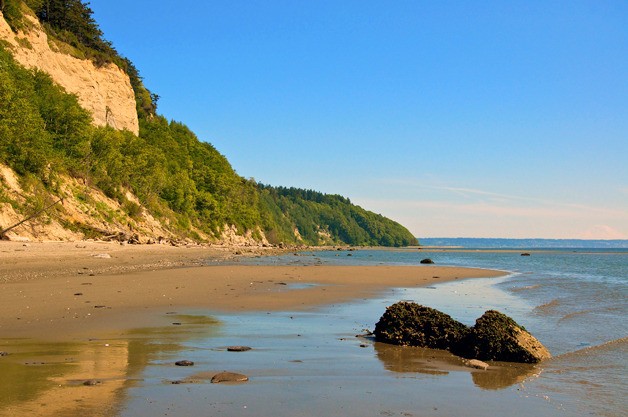Indian Point on southwest Whidbey Island will remain forever wild. The Whidbey Camano Land Trust announced Tuesday that it has purchased two different properties totaling 64 acres at Indian Point to ensure it will be protected for generations to come.
“Indian Point is one of the last stretches of wild land left on Whidbey Island,” said Land Trust Executive Director Pat Powell. “It hasn’t been touched in over a century, which is a long time on the island. It has never been developed.”
The new Indian Point Preserve includes 28 acres of upland with more than 2,100 feet of eroding bluffs along Admiralty Inlet and 36 acres of beach boasting a flourishing marine intertidal area with eel grass and shellfish beds, according to a release.
“This spectacular waterfront property will remain wild for the benefit of fish, wildlife and people forever,” said Land Trust President Tom Cahill.
The purchase was made possible by a national coastal grant from the U.S. Fish and Wildlife Service and Washington Department of Ecology, a Conservation Futures Fund grant from Island County, a 60 percent donation of land value from landowners Greg and Ann Lyle and cash donations from individuals.
“The Indian Point property presented a rare opportunity to preserve a fragile and beautiful forested shoreline and bluff,” said Helen Price Johnson, chair of the Board of Island County Commissioners.
As the shoreline’s steep, 200-foot high feeder bluffs erode, they deposit sediment and nutrients into the tidelands and eelgrass beds below. This sediment drives ecological processes for over five miles of shoreline and tidal flats, helps to shape landforms and build the coast’s beaches while maintaining the habitat required for eelgrass, forage fish beds, juvenile Chinook salmon and shellfish.
The land above the bluff is home to a rare maple forest and is recognized as a Washington State Natural heritage protection priority. A smattering of old-growth Douglas fir and other native trees provide habitat for a variety of birds, songbirds trilling alongside bald eagles, osprey and peregrine falcons.
Powell said the trust will give occasional guided tours of the Indian Point Preserve while the beach will remain open.
“The property has an extensive sandy beach which a lot of people love to use,” she said. “That will be forever open to the public.”



